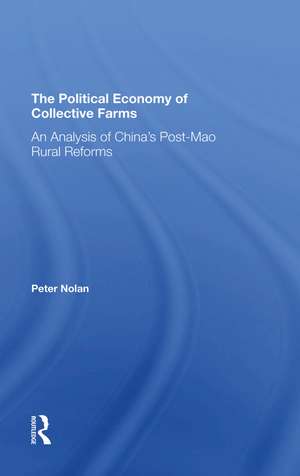The Political Economy Of Collective Farms: An Analysis Of China's Postmao Rural Reforms
Autor Peter Nolanen Limba Engleză Hardback – 27 sep 2019
| Toate formatele și edițiile | Preț | Express |
|---|---|---|
| Paperback (1) | 183.05 lei 43-57 zile | |
| Taylor & Francis – 31 mai 2021 | 183.05 lei 43-57 zile | |
| Hardback (1) | 500.56 lei 43-57 zile | |
| Taylor & Francis – 27 sep 2019 | 500.56 lei 43-57 zile |
Preț: 500.56 lei
Preț vechi: 690.34 lei
-27% Nou
Puncte Express: 751
Preț estimativ în valută:
95.81€ • 104.11$ • 80.53£
95.81€ • 104.11$ • 80.53£
Carte tipărită la comandă
Livrare economică 21 aprilie-05 mai
Preluare comenzi: 021 569.72.76
Specificații
ISBN-13: 9780367294885
ISBN-10: 0367294885
Pagini: 259
Dimensiuni: 144 x 229 mm
Greutate: 0.65 kg
Ediția:1
Editura: Taylor & Francis
Colecția Routledge
Locul publicării:Oxford, United Kingdom
ISBN-10: 0367294885
Pagini: 259
Dimensiuni: 144 x 229 mm
Greutate: 0.65 kg
Ediția:1
Editura: Taylor & Francis
Colecția Routledge
Locul publicării:Oxford, United Kingdom
Cuprins
Introduction -- Bukharinism and Stalinism: Contrasting Paths in the Political Economy of Development -- Theoretical Arguments concerning Collective Farms -- The Chinese Rural Economy under Mao -- The Post-1978 Reforms -- Performance of the Rural Sector since 1978 -- Problems -- Conclusion -- Statistical Appendix
Notă biografică
Peter Nolan is Director of the China Centre, Jesus College; Founding Director, Centre of Development Studies; Chong Hua Professor in Chinese Development (Emeritus); Director of the China Executive Leadership Programme; and a Fellow of Jesus College, University of Cambridge. In 2009 he was awarded the CBE (Commander of the British Empire) 'for services supporting China's integration into the global economy'.
Descriere
Basing his account on a careful analysis of China's rural economy from the 1950s to the 1980s, the author argues that collective farms have serious shortcomings and that they are not the most suitable institutional form for rural economic development in poor countries.
